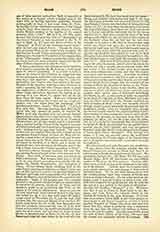

Marienberg, Benedictine abbey of the Congregation of St. Joseph near Mals, Tyrol (in Vintschgau). The history of the founding goes back to Charlemagne, who established between 780 and 786 a Benedictine monastery near Taufers (Tuberis) in Graubunden (in Upper Vintschau), which later (after 880) was dissolved and then became a convent for both sexes. Two hundred years later there was a reorganization: Eberhard of Tarasp built for the male portion the, little monastery of Schuls in the Engadine, consecrated by Cardinal Gregor in 1078 or 1079, while the female inmates remained at Taufers (later called Munster). Destroyed by lightning, Schuls was rebuilt, and consecrated in 1131. Ulrich IV of Tarasp shortly after called monks from Ottobeuern to Schuls to instill new life into the monastery. At the same time the monastery, which till then had been merely a priory, was made an abbey. In 1146 he removed the community to St. Stephen in Vintschgau, and in 1150 to the hill near the village of Burgeis, where the abbey has since continued under the name of Marienberg. Ulrich himself later assumed the habit of the order (about 1164) in Marienberg, and died on December 14, 1177. Under Abbot Konrad III (1271-98) Marienberg was sacked by two nobles, and in 1304 Abbot Hermann was killed by Ulrich of Matsch. In 1348 the plague carried away every inmate of the monastery except Abbot Wyho, a priest, one lay brother, and Goswin, later a chronicler. Goswin became a priest in 1349, and compiled new choir-books, two estate registers (Urbare), and the chronicle of the monastery. The chronicle, most of which Goswin had finished in 1374, is divided into three books, the first of which gives the story of the founding and donations, the second the history of the abbots, and the third the privileges conferred by popes and princes. It gives an account, without regard for order or chronology, of the founders, fortunes, benefactors, and oppressors of the monastery. Documents take up the greater part, and the narrative is poor. Under Abbot Nicholas (1362-88) Goswin became prior, while in 1374 he was appointed court chaplain to Duke Leopold III of Austria. In 1418 Marienberg was burned down. After a period of decline in the sixteenth century, Abbot Mathias Lang (1615-40), from Weingarten monastery, became the reformer of the abbey. In 1634 Marienberg joined the Benedictine Congregation of Swabia. Lang’s successor, Jacob Grafinger (1640-53), enlarged the library, and made the younger members finish their education at schools of repute. In 1656 the abbey was again burned down. Abbot Johann Baptist Murr (1705-32) founded in 1724 the gymnasium at Meran, still administered by the monks of Marienberg. Abbot Pacidus Zobel (1782-1815) compiled a chronicle of the abbots. In 1807 Marienberg was dissolved by the Bavarian government, but was again restored by Emperor Francis II in 1816. In the nineteenth century the following well-known scholars were monks of Marienberg: (I) Beda Weber (1798-1858), from 1849 parish-priest in Frankfort and canon of Limburg, noted as historian, homilist, gifted poet, and energetic priest; member of the Academy in Munich and Vienna; (2) Albert Jager (1801-91), professor of history at Innsbruck, gymnasium director at Meran, from 1851 professor in Vienna and member of the Academy; (3) Pius Zingerle (1801-81), professor in Meran, in 1862 professor at the Sapienza in Rome, later scriptor of the Vatican library, and the greatest authority on Syrian literature. The monastery has now 52 members (40 priests). Apart from the gymnasium at Meran it has the care of four parishes.
KLEMENS LOFFLER

